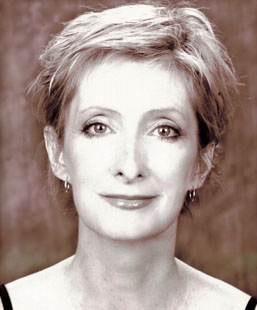Frances Evelyn Bay (née Goffman), actor (born 23 January 1919 in Manville, Alberta; died 15 September 2011 in Los Angeles, California). Frances Bay began her career as a radio actor with the CBC. She studied with Uta Hagen and worked on stage for many years before beginning a Hollywood career when she was in her 50s. Primarily known for playing sweet older women in comedic roles, she amassed nearly 180 credits and was one of the most recognizable character actors of the 1970s, ’80s and ’90s. She won a Gemini Award in 1997 for a guest role in Road to Avonlea and was inducted into Canada’s Walk of Fame in 2008.
Early Life
Frances Goffman was the first child of Max Goffman and Ann Averbach. Both were Jewish and had left Czarist Russia for new opportunities in Canada during the early 1900s. Max was of Ukrainian descent, while Ann was from Russia. Frances’s parents met in Winnipeg, though she was born in Manville, Alberta, where her father had established himself as a shopkeeper. Frances’ younger brother, Erving Goffman (who later became one of the best-known and most respected sociologists of the 20th century), was born in 1922.
In 1926, the family moved to Dauphin, Manitoba, where Max Goffman opened a clothing store. The family later settled in Winnipeg during the Great Depression while Max maintained his store in Dauphin.
Early Career
It was in Winnipeg that Frances began acting. Despite being shy and diminutive, teachers encouraged her to act. She appeared in school plays before moving to radio and stage productions during her college years. Some of her first roles were portraying princesses on CBC Radio programs.
“I always wanted to be an actress,” she once said. “And it wasn't ego. I felt so little about myself, considered myself such a sparrow. Not just my size. I thought I was so plain... I did plays not to show off but because if I did that — I didn't realize it at the time — I would be somebody other than this person I didn't really approve of. I think that's true of a lot of actors.”
Her acting skills were recognized during this time, as she won the Dominion Drama Festival’s best actress award. During the Second World War, she was best known in Canada as “The Girlfriend of the Canadian Forces” on the CBC Radio show Everybody’s Program, where she provided uplifting messages to the troops.

Personal Life
After the war, Frances married her childhood sweetheart, Chuck Bay. She first saw Chuck at a playground in Dauphin. Around the age of nine, she vowed to marry him, which she did when she was 26. They had one son together, Josh, who died tragically at the age of 23.
Frances Bay identified as a socialist. When she began acting in theatre in the 1930s, she was drawn to Winnipeg’s New Theatre Group, which was socialist/leftist in its politics. Bay acknowledged that her own family background did not necessarily put her on the road to socialism, but her experience with the New Theatre Group in depression-era Winnipeg solidified her beliefs.
Career Highlights
Frances Bay moved to the United States with Chuck for his work. She put her acting career on hiatus to support her husband and start a family. When they lived in New York City, Bay continued practicing and honing her craft under the direction of stage legend Uta Hagen. When the family later moved to Boston, Frances began acting again, in dinner theater and on the radio. “I don’t know if it was women’s lib or something that kind of turned inside of me,” she said, “but I just started doing it: got new pictures, started pounding the pavement, went to agents — and I got work.”
In the early-mid 1970s, when she was in her 50s, Frances Bay restarted her acting career in earnest. A move to Los Angeles around 1975 provided numerous opportunities and her career took off. Her first role was a bit part on the detective show Kojak. She continued working regularly in television for the next decade, including on such popular programs as The Mary Tyler Moore Show, CHiPS, Hart to Hart, The Dukes of Hazzard, The Jeffersons, Happy Days, Remington Steele, Family Ties, Cagney & Lacey, Cheers and Hill Street Blues. She also took roles off-Broadway and in regional theatre, including productions of Finnegan's Wake, Grease and The Pleasure of His Company.
Over the course of her career, Bay accumulated nearly 180 credits in film and television. Some of her other credits include Quantum Leap, L.A. Law, Street Legal, The X-Files, The Commish, Da Vinci’s Inquest, ER and Grey’s Anatomy. She primarily played older women in supporting roles, typically frail but sweet elderly women. Though she never became a household name, her numerous screen appearances in major films and TV series made her a ubiquitous presence in Hollywood. She is perhaps best known for two comedic roles from the 1990s: as Adam Sandler’s grandmother in the comedy Happy Gilmore (1996), and for tussling with Jerry Seinfeld over a loaf of marble rye in a 1996 episode of Seinfeld.
Bay was also well known for her collaborations with director David Lynch, who cast her in Blue Velvet (1986), Wild at Heart (1990), Twin Peaks (1990) and Twin Peaks: Fire Walk With Me (1992).
Frances Bay continued acting into her 90s despite having to use a wheelchair, a result of having the bottom part of her right leg amputated in 2002, the same year her husband passed away. She had been hit by a teenager while crossing the street. She was still working until she died in 2011 at age 92.
Honours and Awards
Frances Bay won a Gemini Award in 1997 for her guest role in CBC’s Road to Avonlea. In 2008, she was inducted into Canada’s Walk of Fame, largely due to an online petition and the efforts of friends, family and some of the stars Bay shared screen with, including Henry Winkler and Jerry Seinfeld.

 Share on Facebook
Share on Facebook Share on X
Share on X Share by Email
Share by Email Share on Google Classroom
Share on Google Classroom







